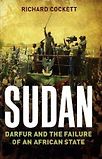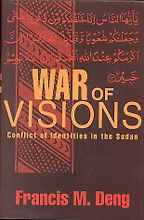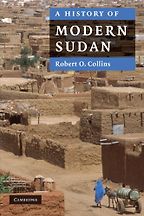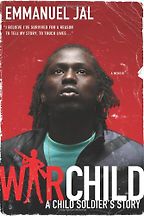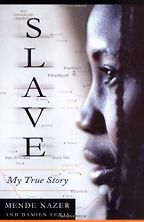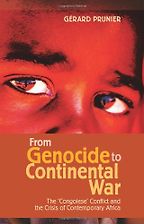Your first book is War of Visions by Francis Deng.
To me it remains the best book on Sudan. It was written in the early 1990s, so it’s almost a generation old now, but it remains the best analysis of why Sudan has descended into so much conflict. Better than that, though, it’s the best analysis of both North and South Sudan. The problem with a lot of books on Sudan is that the authors come from one part of the country and only write about the part they know. The same applies to foreigners who tend to get obsessed with one part of the country, normally Darfur or the South, and then become experts on those regions.
Why?
Well, because Sudan is the largest country in Africa, and trying to understand the whole place is admittedly extremely difficult. And for most of its history it’s been locked into a civil war between the North and the South, which defined conflict in the country. The same focus leads to mistakes in how Sudan is treated internationally, because once again a lot of politicians, the UN and so on, become obsessed: let’s concentrate on one particular area of the country; let’s fix Darfur, for instance. That was the classic mistake: there was a peace deal reached between the North and the South in 2005, but then everyone’s attention went off to Darfur, and that deal was allowed to wither with the result that the South was allowed to suffer. Again, there had been a low-intensity guerrilla war going on in the East from the 1980s until 2006, and everyone forgot about that, because they were concentrating on Darfur, and before that the South.
Does Deng’s book foresee the conflict in Darfur?
Well, the reason I think he’s such a good author is that he’s a Southerner who served for many years in the 1980s in the only truly national government under Jafar Numeiri, an Islamist Northerner who was the only president who managed to reach an accommodation with the South. That constituted a ten-year gap in the civil war. Several Southerners served in Numeiri’s administration, so that allowed Deng to see the Northerners from close up, and he was able to write in detail very coherently about the North just as he was about the South. Deng held important jobs – he was a foreign minister and ambassador to Washington, but he also has a very academic turn of mind. There’s a lot of anthropology in there: he’s very interested in the religious aspects of both Southerners and Northerners as well as some of the politics, so you not only get to understand both – rare enough – but you also get a very rounded view of what makes them tick. When he was writing, the North and the South were at war again, so he was very much concerned with what made the clash there, but he talks a lot about Darfur, and you get a sense of the dislocation between Darfur and Khartoum, and central Sudan. So, although he’s writing before the conflict really blew up in 2003, you get an idea of what’s coming.
Your next book?
A History of Modern Sudan, by an American historian called Robert Collins. It’s probably the best narrative academic study of the country ever produced. He manages to draw a lot of his own scholarship and other people’s books together to get a comprehensive view of the country. Although he was writing before the conflict in Darfur, there’s an appendix dealing with the causes of the war there, so he gives us an understanding of it. It’s also the best book on internal Sudanese politics: he really gets into the governments of the 1970s and 80s. He’s very good on the regime of Numeiri and the appalling government of Bashir, and Hassan al-Turabi in the 1990s: how they destroyed the country and erected this repressive Islamic state. I think that it’s the best history of Sudan written by an outsider. Many books on the Sudan are pretty impenetrable: they tend to get lost replaying these micro-political disputes of the Sudanese élite in the mid-1970s.
Who are the élite?
It’s very Khartoum-based. One of the problems with Sudan historically is that it’s been a very over-centralised state. This is a legacy of the British: basically they constructed Khartoum as the centre of economic activity and devoted almost no attention to the rest of the country, despite it being so big. So the people who held power in Khartoum held power in the rest of Sudan. They were traditionally from the Northern tribes – the ‘Nilotic’ or ‘Riverine’ élite: Arab Muslim tribes who settled on the banks of the Nile, the source of wealth being water for centuries of Sudan’s existence. It’s been a pretty exclusive monopoly of power: very few presidents have come from other regions.
Your next book?
War Child by Emmanuel Jal, who’s mainly known as a Sudanese rapper. The story he tells in songs is that he was a child soldier, one of the Lost Boys of Sudan, basically the children of South Sudanese who were killed, and their villages destroyed, in the 1990s by North Sudanese militias, the forerunners of the Janjaweed. The Lost Boys then had to trudge for months across Sudan to find safe haven in the refugee camps over the border in Ethiopia. Jal’s autobiography is extraordinarily well-told, and chilling. He gives mercilessly detailed accounts of brutal hand-to-hand fighting as the child soldiers of the South, the SPLA – the Southern guerrilla movement – went into combat against North Sudanese forces around Juba for example. And these were 12-, 13-, 14-year-olds doing the most horrendous things: decapitating bodies, stringing their enemies up. It’s an incredible document of just how nasty and savage this all was, and it was all going on just ten years ago.
Five Books interviews are expensive to produce. If you're enjoying this interview, please support us by donating a small amount.
It also gives us a very revealing account of how brutal the SPLA was. They were often lauded as a great liberation movement by many of their American backers, but they were pretty nasty, and the way they trained these child soldiers, the discipline they instilled in them, the harsh training methods, is all there in the book. It’s a gripping read: very memorable images of the fighting, and the sheer animal brutality meted out by both sides. Having read that, it’s almost a wonder they managed to make peace in 2005. Jal was lucky in that he was rescued from the SPLA by some western do-gooders in Nairobi, who recognised him as an unusually intelligent child and gave him an education. To a certain extent he’s been able to live a decent well-adjusted life since, but then he wrote this: about the nightmares he has, and how the experiences shaped him. It is to me the most visceral, well-communicated account of how awful that civil war was. Jal, I think, lives in London now; he was going to be a great star and signed lots of recording contracts, but I don’t think he’s really taken off. I suspect he’s too clever, but, rather than listen to his records, I can recommend his autobiography instead.
Slave by Mende Nazar?
It’s another firsthand account of Sudan and some of the worst aspects of living there. Mende Nazar is a Southerner, born and brought up in the Nuba mountains, in the borderland between the Muslim North and the Christian South, where the two sides of Sudan have mixed most impressively. A lot of families there will have Christian and Muslim members, and she writes about this well: reflecting which particular bunch of missionaries passed through when these people were being brought up. In that sense it’s always held up as one of the most relaxed, easily intermingled, inter-racial, inter-ethnic parts of Sudan. But when the civil war reignited in 1983, the Nuba mountains were in the front line. The North felt the SPLA were very present in the Nuba mountains, and their tactic was the classic Maoist counterinsurgency doctrine to ‘drain the sea to kill the fish’, attacking all villages and towns that might be supporting the SPLA. Nazar’s village was one of them, and the strategy was to kill as many of the men as possible and to enslave the women, young men and boys, who were taken to the North, mainly Khartoum, where they would act as essentially slaves in the houses of rich Khartoumese. Nazar tells of how she was captured and taken to Khartoum and then spent several years in the house of a relatively rich family before being taken off to England where she was expected to act as a slave in the household of an embassy official. It’s from there that she escaped with the help of a Sudanese she met in London, had a famous asylum procedure, and then wrote this book, or rather told it to the journalist Damien Lewis.
What was the life of a slave?
The interesting thing from Sudan’s point of view is that, of course, it’s often taken to be a straight fight between Christians and Muslims there, but Mende Nazar herself was a Muslim, and she was abducted on the grounds that she was an African: so her book bears strong witness to the sheer racism of the country. Her Arab captors, and the Arab family who kept her in Khartoum, looked down on her because she was from an African tribe with very dark skin. Of course, her life was awful: she was treated as a dog, and that was the epithet her captors usually used for her. They disregarded any religious affinity, but treated her as a slave because she was an African. This recurs in Darfur in 2003, where the (Arab) Janjaweed went into action screaming ‘Kill the slaves’, because for them Africans – even fellow Muslims – were synonymous with slaves.
So what you get is a very good insight into that particular aspect of Sudan’s conflicts, and then a very gripping but sad account of how Mende Nazar was treated in Khartoum, and the life of these people who regarded themselves as highly cultivated, highly civilised Arab families, with this 12-year-old Nuba girl tucked out in the back yard and treated as a dog. It also reminds you of the Nazis, because the attitude that she recounts of these Arab families in Khartoum was that this was their civilising mission: they regarded these African tribes as unworthy, as having no equal role to play in Sudan, and their best role would be to be slaves.
What about your last book?
From Genocide to Continental War is about the related conflicts in Rwanda, Burundi and Congo: this was the continent’s largest war, happening from the mid-1990s up to about 2003, involving many African countries, and the result was the largest death toll since the Second World War. Between four and five million died in the eastern Congo from about 1998 to 2003, and what Prunier does is to unpick who is involved, why they were involved and what their real motives were.
Five Books aims to keep its book recommendations and interviews up to date. If you are the interviewee and would like to update your choice of books (or even just what you say about them) please email us at [email protected]

